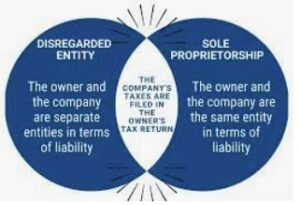
Understanding the Disregarded Entity LLC: A Guide for Your Business
Welcome to our law firm’s guide on disregarded entities and their implications for your business.
Our firm regularly forms LLCs and assists business owners in navigating tax issues.
We can assist in clarifying these concepts and assist you in making informed decisions.
What is a Disregarded Entity?
A disregarded entity, primarily in the realm of taxation, refers to a business entity that is not recognized as separate from its owner for federal income tax purposes. This simplifies tax reporting but has other implications worth considering.
The Common Disregarded Entity: Single-Member LLC
The most typical example is the Single-Member Limited Liability Company (SMLLC). By default, the IRS treats a SMLLC as an extension of its owner, meaning the income and deductions of the LLC are reported on the owner’s personal tax return, usually via Schedule C.
Taxation Choices for Single-Owner Businesses
As a sole business owner, you can operate as a sole proprietorship, form a single-member LLC, or establish a solely-owned corporation. Each choice impacts how your business income is taxed.
- Sole Proprietorship: Direct reporting of business income on your personal tax return.
- Corporation: Options include C corporation (taxed separately) or S corporation (income passes through to your personal tax return).
- LLC: Default is a disregarded entity, but can opt to be taxed as a corporation.
Pros and Cons of a Disregarded Entity
- Simplified Tax Filing: For LLCs, it avoids the dual filing required for corporations.
- Limited Liability Protection: Unlike sole proprietorships, an LLC provides liability protection, though only for non-tax purposes.
- Management and Financing: LLCs are often easier to manage but may face challenges in financing compared to corporations.
- Tax Responsibilities: Remember, LLCs still face other tax obligations like employment and franchise taxes.
Key Considerations for Single-Member LLCs
- Automatic Classification: The IRS defaults to treating a single-member LLC as a disregarded entity, but this can be changed with IRS Form 8832.
- EIN Requirements: Generally not needed unless you have employees or specific tax obligations.
- Multi-Member LLCs: These are not disregarded entities and are treated as partnerships unless they elect corporate taxation.
How We Can Assist?
Our law firm assists your business with formation issues and business operational and legal guidance. We assist to ensure compliance with tax laws and optimizing your entity structure for financial success.
Take the Next Step!
Contact Us Today! We are ready to form your LLC or assist with restructuring your entity. Contact our legal team today for personalized guidance and start your journey to a successful and compliant business entity. Our expertise is your peace of mind.
CLICK HERE for information regarding books published by Attorney Ronald Cook.
CLICK HERE to contact the law firm.


